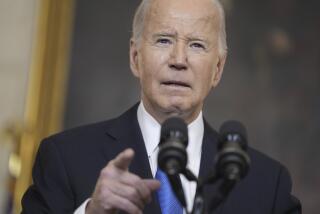Key Republican Opposes Covert Aid to Contras : ‘It Is No Longer Covert,’ Sen. Lugar Says; Seeks ‘Some Other Formula’
- Share via
WASHINGTON — Sen. Richard G. Lugar (R-Ind.), chairman of the Senate Foreign Relations Committee, said Wednesday that he opposes renewed covert aid to Nicaraguan rebels but wants to find some other means of U.S. support for the guerrillas.
“The covert aid situation, I suspect, is not a viable proposition because it is no longer covert,” Lugar said. “We will have to think of some other formula.”
His comments, which echo the position of Sen. David Durenberger (R-Minn.), chairman of the Senate Intelligence Committee, appear to doom the Reagan Administration’s hopes of reviving supposedly secret CIA aid to the rebels who are fighting Nicaragua’s leftist government.
Durenberger has said that he favors some kind of overt military aid to the rebels, known in Central America as contras, but Lugar said he is not certain whether that approach will work.
Close to War Declaration “. . . Essentially, you verge very close to a declaration of war if you go that route,” Lugar told reporters after delivering a foreign policy speech at the National Press Club. “We did not want to declare war on Nicaragua, and the American people may still not want to declare war on Nicaragua.”
President Reagan, in an interview Wednesday with the Associated Press, specifically ruled out extending military aid openly to the rebels.
“I believe that it is in our national interest and security to continue supporting the people of Nicaragua, who are asking nothing more than freedom from totalitarianism,” Reagan said. But, he added, overt aid would “change the situation completely. . . . You then find yourself having to weigh what are then considered acts of war.”
Congress provided more than $100 million in aid to the contras from 1981 through 1984 but rejected an Administration request for $24 million more last fall. Instead, Congress set aside $14 million in aid for consideration this spring.
Administration officials have said that Reagan plans a major push to win the funding. However, Senate Republicans, who normally might help with such a drive, have increasingly criticized the CIA program as ineffective and embarrassing, even while endorsing the Administration’s general policy of pressure on Nicaragua.
“The problem remains how to keep some leverage going so there are some talks,” Lugar said. “I think we are on the threshold of having to formulate a new situation in which we are able to maintain leverage on the Sandinista government, so that genuine negotiations can proceed with that government toward the end that it will not be a menace to its neighbors, destabilizing their activities, and will not be a base for the Soviet Union in our hemisphere.”
He said he believes many of Nicaragua’s leaders would be willing to sign a treaty pledging to respect those two principles--a formula that leaves out the Reagan Administration’s insistence that the Sandinistas must bring democracy to their internal political system.
Lugar called for cautious improvement in U.S. relations with the Soviet Union and supported efforts to reach new arms control agreements. However, he warned that such agreements probably will fail to quell Soviet military expansion and said the United States should respond with continued increases in military spending, including the research program on space-based defenses against nuclear missiles.
Lugar said he plans a series of wide-ranging hearings on the principles of American foreign policy beginning Jan. 31.
More to Read
Get the L.A. Times Politics newsletter
Deeply reported insights into legislation, politics and policy from Sacramento, Washington and beyond. In your inbox twice per week.
You may occasionally receive promotional content from the Los Angeles Times.











